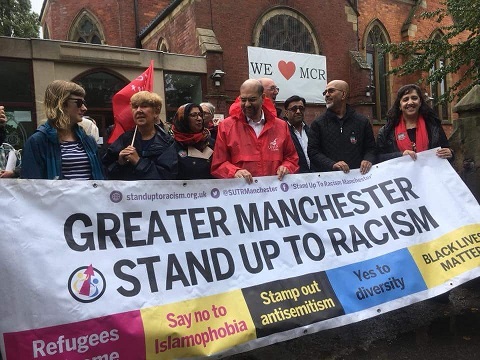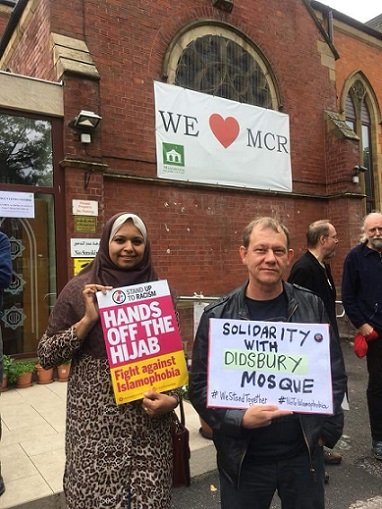MANCHESTER – On 19 August, a far-right protest which took place outside a mosque in the North of England was outnumbered by supporters from all walks of life.
A TV report has reignited calls for a well-loved mosque in Greater Manchester to undergo a change of leadership.
An ‘investigation’ by the BBC this week alleged a call for military jihad was made by the imam of Didsbury Mosque in 2016. The report attempted to link Arabic terms used by the imam with both the intention and the potential to radicalize listeners.
Didsbury masjid, in a wealthy suburb of Manchester, has been the subject of intense media interest since it was found that Salman Abedi occasionally attended the mosque. Abedi detonated a suicide bomb which killed 22 at a concert at the Manchester Arena in May 2017.
No Smoke Without Fire?
Didsbury is known to be a place of welcome for one of the most diverse congregations outside London.
Regular attendees include families with roots in North Africa, the Middle East, Turkey and a growing number of British converts to Islam. It is renowned for its community open days and interfaith events.
On 16 December 2016, Imam Mustafa Graf, began his Friday khutbah in Arabic, before providing a broad translation of the sermon in English.
The khutbah in question included prayers for “mujahideen” a term the BBC describes as ‘commonly used for Islamist guerrilla fighters’.
“We ask Allah to grant them mujahideen – our brothers and sisters right now in Aleppo and Syria and Iraq – to grant them victory,” Imam Mustafa is heard saying on the recording.
(recording here)
In another segment, the BBC’s own translation of the Arabic records the imam saying:
“Lots of brothers stayed behind, unfortunately. They love Islam and Muslims but they do nothing for the support of their brothers and sisters.” And “Jihad for the sake of Allah is the source of pride and dignity for this nation.”
The BBC’s report encourages viewers to reflect on how the words might have been perceived by, Salman Abedi’s twisted logic. At the same time, it concedes no evidence exists to show Abedi was in the mosque that day.
ITV Reporters gathered outside the mosque as the media furor gained pace, asked men attending prayers what they remembered of the khutbah.
One said it was ‘encouraging us to be good UK citizens’, whilst another said the imam’s khutbahs generally remind the congregation ‘how to be a good Muslim in this community’ according to an ITV report.

Situation in Aleppo
Whilst already under this scrutiny, why would the imam give such a khutbah?
The BBC report hints at the context of the talk but fails to explore this pivotal factor in depth.
On 7 December 2016, leaders of Canada, France, Germany, Italy, the UK, and the United States gave a joint statement on the situation in Aleppo.
Some 200,000 civilians, including many children, in eastern Aleppo, were cut off from food and medicine supplies at the time.
On the 13 December 2016, three days before khutbah, the UN reported that 82 civilians had been shot dead in recaptured districts of Aleppo, Syria’s largest city before the civil war began in 2011.
The news about Syria was at that time ‘wall to wall.’ The unfolding horrors in Aleppo and beyond were being discussed by people from all walks of life.
The US Ambassador to the United Nations, Samantha Power, made her own condemnatory comments:
“Aleppo will join the ranks of those events in world history that define modern evil, that stain our conscience decades later – Halabja, Rwanda, Srebrenica, and now Aleppo.”
Manchester Islamic Centre Committee has released a statement, accusing the BBC of, ‘sensationalist reporting’ ‘not helpful to the Muslim community or the wider community.’
It questions the style of the report which gives a feeling that inside the mosque walls, dark plotting is constantly afoot.
“The Friday prayer was aimed at encouraging the worshipers at the center to donate generously to such causes and to pray to God to help those victims of oppression,” the mosque committee has said.
In an email shown to AboutIslam, William Scott, a Christian, joined support for the mosque amidst a growing disappointment at the BBC’s reporting style. Writing directly to Didsbury masjid Scott said,
“I think the report of the BBC was wrong, sensationalist and ignorant”.
Having heard sections of the khutbah on TV, he concludes it was “a call for help and support for suffering people.”
Sunday, a handful of far-right members of DFLA gathered near Didsbury Mosque. The counter demonstration called by Stand Up To Racism (SUTR) was far larger, attended by neighbors, dignitaries, solidarity activists and Yasmine Dar of Labour’s NEC.
“We reject this racism – terrorism has no religion,” said SUTR Manchester.
Greater Manchester Police are reviewing the material “to establish if any criminal offenses have been committed”.
However, the link between men, full of hate, with the potential for violence and what they hear has been established. According to their own fallacious logic, the BBC may be responsible for radicalization.